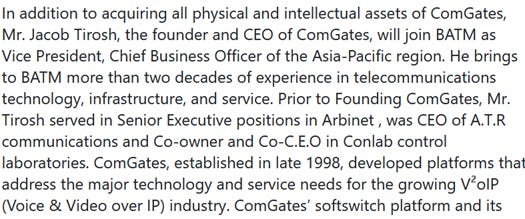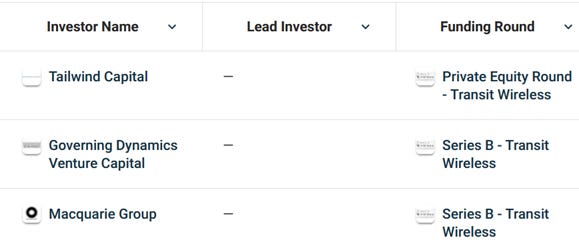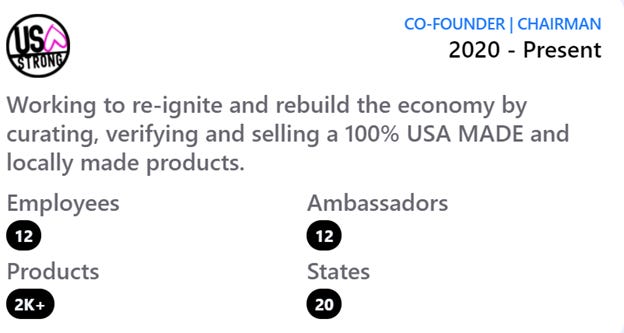A Pattern of Deception, Part 2: The Art of the Exit
Got 99 problems and a successful business ain't one!
Previously, we examined the story of @CelsiusNetwork founder @mashinshy and his first company, Arbinet.
Today, let’s look at some of Alex Mashinsky’s other “successes” and the pattern of misrepresentation and confabulation that defines his career.
Mashinsky claims to be the founder of 8 companies with over "$3 Billion in Exits." This is a claim he repeats frequently. These companies are Arbinet, Comgates, Elematics, Groundlink, Transit Wireless, Governing Dynamics, US Strong, and Celsius Network.
Comgates, founded in 1997, was a spin-off from Arbinet. Mashinsky claims to have raised $20 millon for the company prior to selling it.
I could not verify these claims. There is a heavily pixelated document on his personal site showing $16.5 million in funding.
The one article I could find about the Comgates acquisition makes no mention of Mashinsky, referring to the CEO, Jacob Tirosh, as its founder.
Simultaneously, Mashinsky founded Elematics, focusing on network-to-network interfaces. In this interview in 2020, Mashinsky claims that their technology underpins modern cloud computing technology.
In this interview, he also stated that he raised "$23-24 million" for Elematics. However, he fails to note that $11 million of that money came from his own VC fund, Governing Dynamics:
While claiming that Elematics-developed technology is the foundation for modern cloud computing, Mashinsky can't even remember who ended up buying the company. I could not find information about what ended up happening to Elematics either...
Mashinsky founded his "venture capital" firm Governing Dyamics in 2004, according to his website. However, Crunchbase data shows Series A funding to Elematics from GD in 2001, suggesting it was founded earlier.
Mashinsky next founded Groundlink in 2004. He claims it was "Uber before Uber," and in the before-mentioned interview insists that Uber stole the idea from him:
Mashinsky alternately insults the money-losing approach Uber took to get customers (on his website) and claims that subsidizing rides was his idea that other investors failed to back:
Groundlink raised over $85 million dollars in funds. Of that, $65 million again came from Mashinsky's Governing Dynamics:
Mashinsky leaves Groundlink in 2010. The company is eventually sold in 2017 to BostonCoach, and ends up ceasing operations in 2020.
However, Mashinsky continues to list himself as Managing Partner of Groundlink on his website.
While I was researching this thread, Mashinsky's Transit Wireless seemed like the most successful firm. It installed and operates a free WiFi system for the NYC subway, and claims to generate revenue by charging phone carriers for its service.
Transit Wireless won the contract to provide this service in 2007, agreeing to pay $46 million for the license. Notably, this was $45,999,996 more than the next-highest bidders…
Mashinsky claims the idea to put WiFi in the subway system was his idea (of course)...
Transit Wireless raised 35 million in series B funding. Guess who one of the two investing firms was?
Unfortunately, by 2010, little progress had been made. Apparently, Transit didn't actually have the money to execute the project. To complete the project, an Australian telecom company provided funding in return for assuming control of Transit Wireless:
I noted that one of the "failures" Mashinsky talks about is how the financial crisis cost him control of a company and led to refinancing at another. I think he is referring to Groundlink and Transit Wireless. Interesting that he lists some of his companies as both successes and failures!
The final two companies @Mashinsky has started are Celsius Network and, in 2020, an online retailer called US Strong, purporting to sell 100% US made products:
The USA Strong website features self-branded clothing and items with Celsius Network logos, in addition to a grab-bag assortment of other items.
There's no way to know, but I sort of doubt this is a major engine of commerce...
So what are some common themes in all of these ventures?
1. Mashinsky claims to have raised tens of millions in venture capital. However, his own VC firm provided a significant chunk of the proceeds in every instance
2. Mashinsky continues to make huge claims, like inventing cloud computing and Uber, yet the companies he built to capitalize on these inventions apparently no longer exist. As far as I can tell, no one has ever had to pay Mashinsky or these firms any licensing costs related to intellectual property, either.
3. It is unclear how Mashinsky generated "$3 billion" in "successful exits." Even if we accept the wild valuations he assigns to his companies (Transit Wireless = $1.2 billion), the math doesn't add up.
4. Mashinsky clearly is not in the business of building sustainable enterprise. The only one I could identify that appears to have delivered on its promises, Transit Wireless, needed a bailout and takeover just to complete its promised network.
Based on this review of Alex Mashinsky’s career, the founder and CEO of Celsius Network has perfected the art of one thing: The Exit.
By emphasizing "the exit," Mashinsky tells us all what he cares about the most: Extricating himself and his partners from his various failed ventures with as much money as possible.
How does this qualify a person to run a complex >$20 billion crypto lending enterprise? You tell me.






















